
Rongbaxinna, a member of the 13th National Committee of the Chinese People's Political Consultative Conference (CPPCC), receives an interview ahead of the third plenary meeting of the first session of the 13th CPPCC National Committee at the Great Hall of the People in
Political advisers at the two sessions proposed to establish a national database to record the cultural heritage of ethnic groups with small populations.
The proposal was initiated by folk singer Rongbaxinna, a member of the 13th Chinese People's Consultative Conference National Committee, who is from the Pumi ethnic group in Southwest China's
Rongbaxinna suggested the country's cultural departments preserve the traditional art forms through multimedia channels and by collecting them at national-level archives.
There are more than 40,000 people in the Pumi ethnic group in
"Pumi people have no written language," she said. "More efforts should be taken to care more for the art forms, which are passed from mouth to mouth."
Rongbaxinna, 38, rose to nationwide fame in 2006 through a youth singing contest on China Central Television.
She was invited to perform at the Kremlin in 2013 when state leaders of
"Thanks to our country's ethnic affairs policy, all ethnic groups are equal, no matter how small of a population it has," she says. "And, cultural diversity in